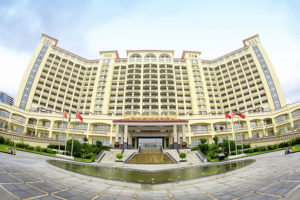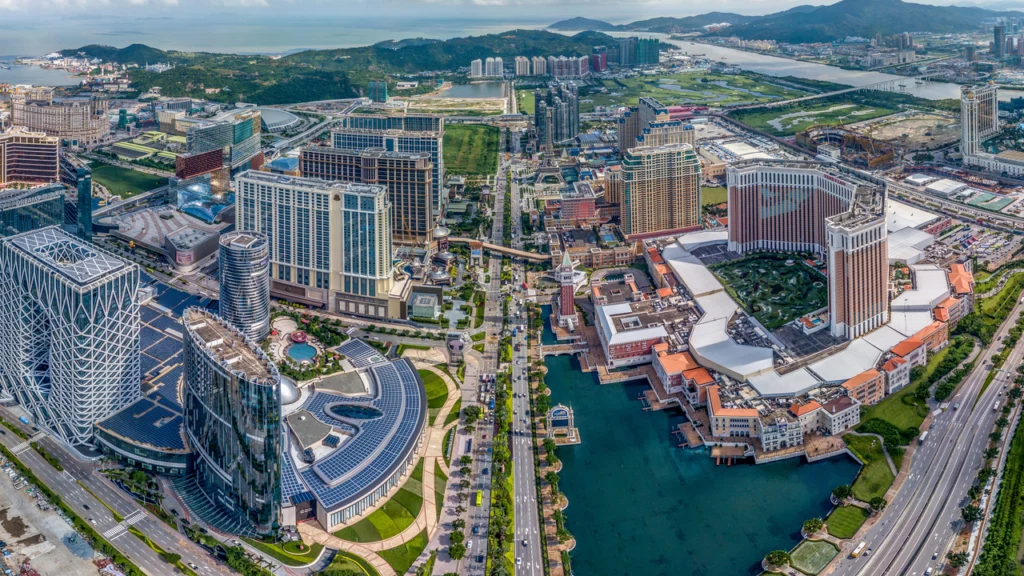During his visit to the Legislative Assembly (AL) last week, Chief Executive Ho Iat Seng stated that to expand the sources of tourists in the Macau SAR, authorities were studying the possibility of having more three-star hotels.
In the first six months of the year, the average occupancy rates of two and three-star hotels were both higher than those of four and five-star hotels. Recently, 14 visitors told PLATAFORMA that they preferred to save money on accommodation and spend more on shopping and meals; six admitted they would stay longer if the rooms were cheaper. All interviewed tourists appealed to the industry to lower prices. One even claimed that “Macau’s hotels are too expensive” and that luxury hotel prices are “unacceptable.”
Reduced Percentage

Hotel Four Seasons in Macau
By the end of June, there were 131 operating hotel units with approximately 43,000 rooms, according to the Statistics and Census Service (DSEC). Among these, 6,100 rooms belong to three-star hotels (14 percent of the total), while 8,600 rooms (20 percent) and 25,900 rooms (60 percent) belonged to four and five-star hotels, respectively. With the opening of five-star hotels such as the new Raffles and Andaz at Galaxy Cotai, as well as the W Hotel at Studio City in the second half of the year, it is expected that the number of rooms in five-star hotels will increase further.
In response to a question in the AL last Friday, the Chief Executive stated that the facilities and services of hotels in Macau are already of high quality. However, Ho admitted that room prices are not competitive and that there are too many five-star hotels compared to others, and he would study the increase in the proportion of three-star hotels in the medium term.
Both Andy Wu, President of the Macau Tourism Industry Association, and Lo Chi-leung, President of the Macau Hoteliers Association, support this idea. Quoted by the Macau Daily News, Wu stated that most group tourists would choose three or four-star hotels to reduce travel expenses, and that if the number of these hotels were higher, they would have more options. In the same newspaper, Lo Chi-leung pointed out that more three or four-star hotels would increase competition in that category, enhancing the city’s attractiveness as a tourist destination.
Attractive Investment?
However, Rutger Verschuren, Vice Chairman of the Macau Hotel Association, believes that it will be difficult to attract investors to build three-star hotels. He points out to PLATAFORMA that by the end of the year, there will be 50,000 available rooms, and the increase in the supply of five-star hotel rooms, coupled with the growing demand for four and three-star hotels, should lower the price of five-star hotels. When this happens, the prices of three and four-star hotels should decrease to maintain a gap from the lower rates offered by five-star hotels. “Integrated five-star casino hotels may possibly lower their prices, as they are supported by other revenue sources but continue to offer the best quality possible,” he says. Therefore, hotels of lower tiers “may suffer, as construction and operational costs, including labor, are high. So, we should not expect much enthusiasm from investors to build three-star hotels.”
– Only 6,100 rooms in the city, or approximately 10 percent of the total, belong to three-star hotels.
Pushing to the Side

Hotel Gloria in Macau
Verschuren indicates that the new hotels in Hengqin should be included in the equation, especially now that border control with Macau is being facilitated. “Labor costs in Hengqin are probably lower than in Macau, so their hotels may be more flexible with prices. Therefore, the Zone may be more suitable for lower-rated hotels,” he suggests.
Glenn McCartney, Associate Professor of International Integrated Resort Management at the University of Macau, agrees that Hengqin is an option for Macau to increase the number of hotels, considering the lack of land in the city. “Perhaps there could be some form of strategic partnership with Hengqin,” he highlights.
“Labor costs in Hengqin are probably lower than in Macau, so their hotels may be more flexible with prices. Therefore, the Zone may be more suitable for lower-rated hotels.”
Rutger Verschuren, Vice Chairman of the Macau Hotel Association
Regarding the proportion of three-star rooms, McCartney emphasizes that this involves planning, and accommodation, public transportation, the airport, and carrying capacity should be part of the overall plan for the future development of Macau’s tourism industry. McCartney adds that the increase in the proportion of three-star hotels will not be immediate, as it takes time not only to complete their construction but also the approval process, site selection, attracting investors, etc. “I believe that short- and medium-term strategic partnerships are needed if we want to drive the MICE industry earlier.”
A Big Plan to Start
The “Plan for the Proper Diversification of the Economy (2024-2028)” is under public consultation. One of the goals is for the gross value added from non-gaming activities to be 60 percent by 2028. In an interview with Exmoo News, Samuel Tong, President of the Macau Management Institute, said that achieving the set goals would not be easy. The economist pointed out that many resources and efforts would be needed for 60 percent of the local economy to become non-gaming by the stipulated date.
Rutger Verschuren says that the industry warmly welcomes the plan for economic diversification but that it will eventually require new laws. The Vice Chairman of the Macau Hotel Association suggests that since changing laws takes time, new chapters and regulations could perhaps be developed and implemented in the short term within existing laws, and these new initiatives could be put into practice using the concept of short-term pilot projects.
“Perhaps there could be some form of strategic partnership with Hengqin.”
Glenn McCartney, Associate Professor of International Integrated Resort Management at the University of Macau
McCartney points out that the current gaming concessions last only 10 years and should expire before 2033, with the midterm review perhaps taking place in 2027 or 2028. The professor warns that the concession contracts involve various land plots and projects, some of which may require legal support and talent, all of which take time to refine.



